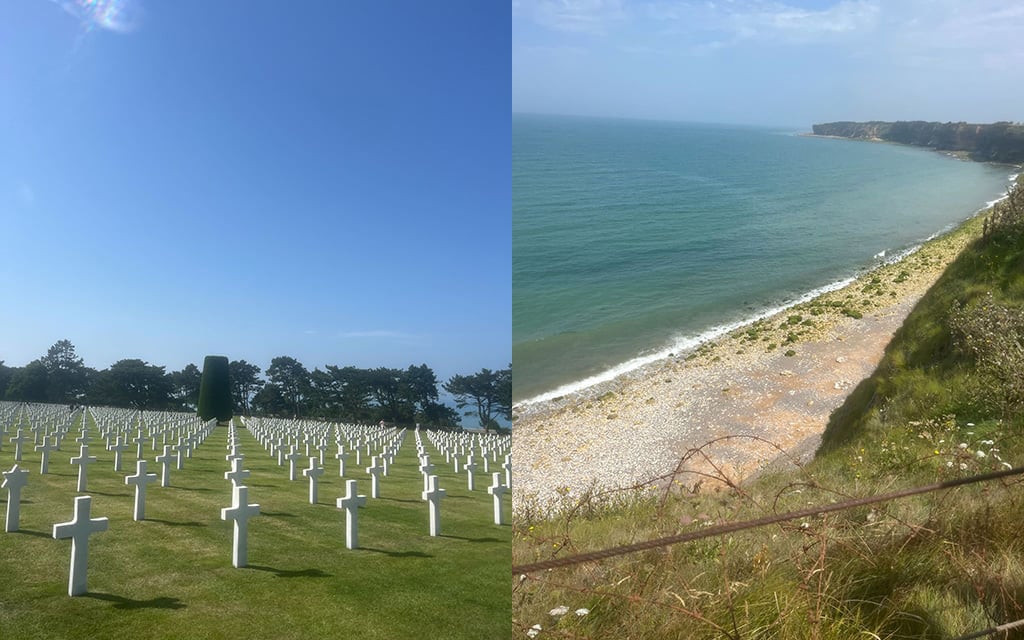
Left, the markers at the American Cemetery are a powerful reminder of lives lost. Right, the beaches of Normandy send a peaceful message today, a sharp contrast to the horrors there during World War II. (Photo by Scott Sandulli/Special for Cronkite News)
NORMANDY – “American?”
My attention on the calm, crashing waves and steep cliffs in front of me was halted by a distinct yet clear French accent. Looking back, I found a middle-aged male, decked out in “Team France” gear at the height of the Summer Olympics. His hand shot out of a cannon to meet mine, finishing the unexpected exchange with overwhelming gratitude.
“Thank you for what you did for our country,” he said.
He may have looked me, a 21-year-old journalism student, in the eye when expressing his compassion, but his sentiments would have been far more appropriate for the man who once wore the dog tag that now dangles around my neck.
Private Daniel Miller may not have stood anywhere near the beaches of Normandy, but it was his comrades who gave their lives on the shores behind me, defending a universal flag of freedom 80 years ago this summer.
As Paris and the nation of France welcome the world in the athletic capacity of the Olympics this summer, one would be remiss to not take advantage of the proximity to experience a piece of history on France’s west coast. Just a two-hour train ride west from the City of Light brings one to the small town of Bayeux, where 20 minutes beyond its iconic cathedral and tapestry sits the site of one of the world’s most fateful days.
On June 6, 1944, at the height of World War II, forces made up primarily of U.S., British and Canadian soldiers launched the largest amphibious invasion of the time, crossing the English Channel and fighting off fierce coastal defenses to establish a beachhead for a launching point to take back Fortress Europe from Nazi Germany. Through landings at five zones spanning 50 miles along the coastal French province of Normandy, the Allies rolled back the enemy, liberating Paris in weeks, before emerging from the war victoriously and restoring peace and democracy to France and the world 11 months later.

Author Scott Sandulli holds the dog tag of his great-grandfather, who enlisted in the United States Air Force shortly after the breakout of World War II. (Photo by Scott Sandulli/Special for Cronkite News)
My passion for history runs like blood in my veins, partly because that blood is comprised of a small piece from it. My great-grandfather, Daniel Miller of central Connecticut, enlisted in the United States Air Force shortly after the breakout of World War II but was never deployed internationally. He never faced down near-certain death like hundreds of thousands of his brothers on that rainy summer morning from hell. But it was his and so many others’ contributions to the war effort stateside that helped make a necessary undertaking possible, eventually achieving resounding success.
A few generations later, rather than being drafted into the service, I was accepted for this once-in-a-lifetime program to cover the Summer Olympics from sporting and cultural standpoints. Immediately, I knew I couldn’t understand France’s rich history and culture without walking Normandy’s notorious battlefields, and bring my since-deceased great-grandfather, a man with as high honor as those who lost their lives there, with me.
If only in the form of a 2-inch piece of engraved metal, the spiritual connection with the sand and the heavens, those who did and did not die there, was deeper than the massive craters littering the ground long after their mortars exploded. The smallest of details that greet you from the train station 20 minutes away to the waves of the Channel sent the most powerful messages. Bullet holes still unfilled on the outside of simple villagers homes. Dug-out concrete bunkers accompanied by massive anti-aircraft guns are well preserved atop the bluffs. The silent peace of the American Cemetery tugged on every emotional string, even though I recognized not a name on the thousands of perfectly arrayed marble gravestones.
Perhaps the most striking intricacy of the hallowed ground came in the beaches themselves. The Omaha sector, dubbed “Bloody Omaha” by then British Prime Minister Winston Churchill due to the intense and chaotic fighting that occurred there, was chock full of people. Rather than a full soldier’s outfit and Czech Hedgehogs to divert their maneuvers, these were simple beach-goers, soaking up the sun on a cloudless day by the water.
I couldn’t believe what I was seeing. Disregard the fact of it being a national memorial site. These people, some even with various international flags possibly on a getaway day from cheering on their country at the Olympics, laid out their blankets and pitched their umbrellas on the same grains where thousands of young men took their last breaths. How did this not enter their minds?
With a patriotic spirit around my neck and in my own heart, I couldn’t get over what I deemed to be an ultimate showing of disrespect. My great-grandfather could have easily been killed at the spot where one was now getting a tan. Whether these were locals or tourists on an excursion from the bustle of the Olympics like myself, how could anyone find this acceptable? I turned to my tour guide, who had not missed an inch of land or a tale of a soldier all afternoon, completely perplexed.
“People just…go to the beach here?” I asked.
“Yes! That’s what those men fought for,” she said. “They died there so that one day people may live free there again.”